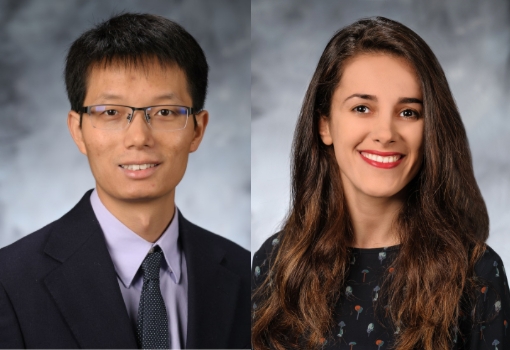Zheng Zhang wants to make the manufacturing of semiconductor chips more reliable. Mahnoosh Alizadeh hopes to increase the levels of wind and solar energy in the power grid. In order to be successful, the two assistant professors in UC Santa Barbara’s Electrical and Computer Engineering Department are designing innovative methods to quantify and account for the unknown. Their research projects received a significant boost when each received an Early CAREER award from the National Science Foundation. The awards include up to $500,000 in funding to pursue cutting-edge research and advance excellence in education through the NSF Faculty Early Career Development program.
“I’m very excited,” said Zhang, whose research lies at the intersection of computational mathematics, electrical engineering, and computer science. “With this award, I will be able to investigate some long-standing problems with a relatively long-term plan to discover solutions.”
The problem that Zhang and his students want to solve is the inconsistent performance of electronic and photonic integrated circuits. Because it is extremely difficult to control precisely the nano-scale fabrication process, Zhang says some semiconductor chips work well, some underperform, and others don’t work at all.
Through uncertainty-aware design automation, Zhang and his students hope to make semiconductor manufacturing more efficient and the products more consistent. Uncertainty awareness means Zhang wants to expect the unexpected and adjust ahead of time.
“The short-term goal is to develop efficient algorithms to model, verify, and optimize the uncertain performance of an electronic or photonic chip before it’s being fabricated,” said Zhang, who joined UCSB’s Electrical and Computer Engineering Department in July 2017. “This will significantly improve the product yield of a semiconductor company by increasing the percentage of successful chips in mass production, which will benefit consumers.”
Zhang is interested in extending his methodology in the long-term to other challenging domains, such as robotics and self-driving automobiles.
“Quantifying uncertainty is essential for autonomous systems because they need to make smart decisions in order to operate successfully despite variables like traffic, weather, and noisy sensor data,” said Zhang, who has also earned the Best Paper Award from IEEE Transactions on Components, Packaging and Manufacturing Technology, and the Best Conference Paper Award from IEEE’s Electrical Performance of Electronic Packing and Systems after he joined UCSB.
Alizadeh’s research project centers on the uncertainties involved with humans and their use of electricity.
“Renewable energy is produced randomly. It depends on when the wind blows or the sun shines,” explained Alizadeh. “Our goal is to design mechanisms that incentivize users to shift their electricity demand to times when there is more renewable energy being produced so that we can integrate higher levels of solar and wind energy into the power grid.”
The biggest challenges to overcome are that renewable energy output is variable, and people, unlike sensors and actuators, are not predictable and cannot be easily modeled mathematically.
Given those factors, Alizadeh’s research project will focus on the design of real-time control systems and learning algorithms that can capture and reproduce variability observed in human behavior. Once that is accomplished, it will enable end-use demand management, a requirement for the safety and efficiency of renewable-friendly power grids, and electric and autonomous transportation systems.
“To demonstrate the value of our algorithms for a specific type of price-responsive electricity demand, we will apply it to electric-vehicle smart charging at public parking lots and fast-charging stations,” said Alizadeh, who earlier this year received the Northrop Grumman Excellence in Teaching Award, presented annually to junior faculty who demonstrate excellence in their teaching techniques, activities, and lectures. “We see our project as a way to move the nation closer to a more flexible and efficient power grid.”
Zhang and Alizadeh are the latest junior faculty in UCSB’s College of Engineering to receive NSF CAREER awards. Bolin Liao in the Mechanical Engineering Department received one last month. According to UCSB’s Office of Research, the College of Engineering ranks first among public universities and third overall in the highest percentage of eligible assistant professors who received NSF CAREER awards. Between 2007-17, 38 eligible junior faculty in UCSB’s College of Engineering received a total of 44 awards.
“The NSF CAREER Award recognizes researchers based on their potential for future contributions to education and research,” said Rod Alferness, dean of UCSB’s College of Engineering. “Professors Zhang and Alizadeh are shining examples of the high-quality junior faculty we have in the College of Engineering, who possess tremendous potential to create new knowledge and innovations that address complex societal challenges and opportunities.”
Zhang recognized on-campus support and resources provided by senior faculty and the Office of Research for helping create funding opportunities for junior faculty, like through the NSF award.
“They help us ramp up our research projects and plans in the early stages of our career development,” said Zhang. “As a result, we can focus more on research, teaching, and producing more significant scientific results.”
Alizadeh also credited the collaboration within the College of Engineering and throughout campus for contributing to the success of junior faculty.
“This interdisciplinary environment allows junior faculty to be the best version of themselves by doing exactly the type of research they like to do instead of conforming to expectations of what they are supposed to do,” she said.

UCSB College of Engineering's Zheng Zhang (left) and Mahnoosh Alizadeh each received an NSF Early CAREER Award.
